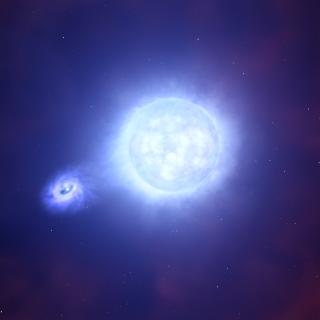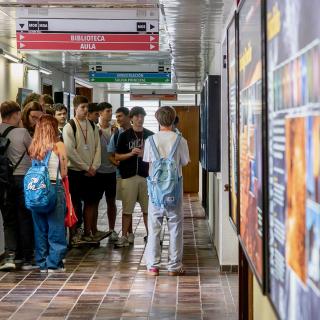It may interest you
-
 Massive stars in metal-poor galaxies often have close partners, just like the massive stars in our metal-rich Milky Way. This has been discovered by an international scientific team in which research staff from the Instituto de Aastrofísica de Canarias (IAC) and the Universidad de La Laguna (ULL) participate. They used the European Very Large Telescope in Chile to monitor the velocity of massive stars in the Small Magellanic Cloud. The research is published in Nature Astronomy . For the past twenty years, astronomers have known that many massive stars in the metal-rich Milky Way have aAdvertised on
Massive stars in metal-poor galaxies often have close partners, just like the massive stars in our metal-rich Milky Way. This has been discovered by an international scientific team in which research staff from the Instituto de Aastrofísica de Canarias (IAC) and the Universidad de La Laguna (ULL) participate. They used the European Very Large Telescope in Chile to monitor the velocity of massive stars in the Small Magellanic Cloud. The research is published in Nature Astronomy . For the past twenty years, astronomers have known that many massive stars in the metal-rich Milky Way have aAdvertised on -
 El Instituto de Astrofísica de Canarias organiza visitas guiadas y participa en la Feria de las Vocaciones Científicas de Canarias dentro de la Noche Europea de los Investigadores de la Macaronesia El Instituto de Astrofísica de Canarias (IAC) participará en MacaroNight 2025, la Noche Europea de los Investigadores e investigadoras de la Macaronesia, con dos actividades dirigidas a estudiantes de diferentes niveles educativos para acercar la astrofísica y fomentar las vocaciones científicas entre la juventud canaria. Visitas guiadas a la sede central del IAC Los días 22 y 23 de septiembre, elAdvertised on
El Instituto de Astrofísica de Canarias organiza visitas guiadas y participa en la Feria de las Vocaciones Científicas de Canarias dentro de la Noche Europea de los Investigadores de la Macaronesia El Instituto de Astrofísica de Canarias (IAC) participará en MacaroNight 2025, la Noche Europea de los Investigadores e investigadoras de la Macaronesia, con dos actividades dirigidas a estudiantes de diferentes niveles educativos para acercar la astrofísica y fomentar las vocaciones científicas entre la juventud canaria. Visitas guiadas a la sede central del IAC Los días 22 y 23 de septiembre, elAdvertised on -
 El Instituto de Astrofísica de Canarias (IAC) se suma a la conmemoración del Día Internacional de las Mujeres y las Niñas en la Ciencia con un amplio programa de actividades orientadas a visibilizar el papel de las mujeres en la astronomía y fomentar el interés por la ciencia y la tecnología entre las nuevas generaciones. Entre las acciones más destacadas se encuentra la Editatona 11F, organizada junto a Wikimedia España. La iniciativa se articula en dos jornadas complementarias: un wikitaller práctico de introducción a la edición en Wikipedia, en el que las personas participantes aprendenAdvertised on
El Instituto de Astrofísica de Canarias (IAC) se suma a la conmemoración del Día Internacional de las Mujeres y las Niñas en la Ciencia con un amplio programa de actividades orientadas a visibilizar el papel de las mujeres en la astronomía y fomentar el interés por la ciencia y la tecnología entre las nuevas generaciones. Entre las acciones más destacadas se encuentra la Editatona 11F, organizada junto a Wikimedia España. La iniciativa se articula en dos jornadas complementarias: un wikitaller práctico de introducción a la edición en Wikipedia, en el que las personas participantes aprendenAdvertised on
